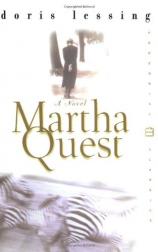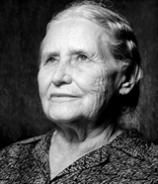Excerpt
Excerpt
Martha Quest

Chapter One
Two elderly women sat knitting on that part of the veranda which was screened from the sun by a golden shower creeper; the tough stems were so thick with flower it was as if the glaring afternoon was dammed against them in a surf of its own light made visible in the dripping, orange-coloured clusters. Inside this coloured barrier was a darkened recess, rough mud walls (the outer walls of the house itself) forming two sides, the third consisting of a bench loaded with painted petrol tins which held pink and white geraniums. The sun splashed liberal gold through the foliage, over the red cement floor, and over the ladies. They had been here since lunchtime, and would remain until sunset, talking, talking incessantly, their tongues mercifully let off the leash. They were Mrs Quest and Mrs Van Rensberg; and Martha Quest, a girl of fifteen, sat on the steps in full sunshine, clumsily twisting herself to keep the glare from her book with her own shadow.
She frowned, and from time to time glanced up irritably at the women, indicating that their gossip made it difficult to concentrate. But then, there was nothing to prevent her moving somewhere else; and her spasms of resentment when she was asked a question, or her name was used in the family chronicling, were therefore unreasonable. As for the ladies, they sometimes allowed their eyes to rest on the girl with that glazed look which excludes a third person, or even dropped their voices; and at these moments, she lifted her head to give them a glare of positive contempt; for they were seasoning the dull staple of their lives - servants, children, cooking - with a confinement or scandal of some kind; and since she was reading Havelock Ellis on sex, and had taken good care they should know it, the dropped voices had the quality of an anomaly. Or rather, she was not actually reading it: she read a book that had been lent to her by the Cohen boys at the station, while Ellis lay, like an irritant, on the top step, with its title well in view. However, there are certain rites in the talk of matrons and Martha, having listened to such talk for a large part of her life, should have learned that there was nothing insulting, or even personal, intended. She was merely expected to play the part 'young girl' against their own familiar roles.
At the other end of the veranda, on two deck-chairs planted side by side and looking away over the bush and the mealie fields, were Mr Quest and Mr Van Rensberg; and they were talking about crops and the weather and the native problem. But their backs were turned on the women with a firmness which said how welcome was this impersonal talk to men who lived shut into the heated atmosphere of the family for weeks at a time, with no refuge but the farmwork. Their talk was as familiar to Martha as the women's talk; the two currents ran sleepily on inside her, like the movements of her own blood, of which she was not conscious except as an ache of irritation when her cramped position made her shift her long, bare and sunburnt legs. Then, when she heard the nagging phrases 'the Government expects the farmers to . . .' and 'The kaffirs are losing all respect because . . .' she sat up sharply; and the irritation overflowed into a flood of dislike for both her parents. Everything was the same; intolerable that they should have been saying the same things ever since she could remember; and she looked away from them, over the veld.
In the literature that was her tradition, the word farm evokes an image of something orderly, compact, cultivated; neat farm-house in a pattern of fields. Martha looked over mile or so of bush to a strip of pink ploughed land; and then the bush, dark green and sombre, climbed a ridge to another patch of exposed earth, this time a clayish yellow; and then, ridge after ridge, fold after fold, the bush stretched to a line of blue kopjes. The fields were a timid intrusion on a landscape hardly marked by man; and the hawk which circled in mile-wide sweeps over her head saw the house, crouched on its long hill, the cluster of grass huts which was the native compound huddled on a lower rise half a mile away; perhaps a dozen patches of naked soil - and then nothing to disturb that ancient, down-peering eye, nothing that a thousand generations of his hawk ancestors had not seen.
The house, raised high on its eminence into the blue and sweeping currents of air, was in the centre of a vast basin, which was bounded by mountains. In front, there were seven miles to the Dumfries Hills; west, seven miles of rising ground to the Oxford Range; seven miles east, a long swelling mountain which was named Jacob's Burg. Behind, there was no defining chain of kopjes, but the land travelled endlessly, without limit, and faded into a bluish haze, like that hinterland to the imagination we cannot do without - the great declivity was open to the north.
Over it all curved the cloudless African sky, but Martha could not look at it, for it pulsed with light; she must lower her eyes to the bush; and that was so familiar the vast landscape caused her only the prickling feeling of claustrophobia.
She looked down at her book. She did not want to read it; it was a book on popular science, and even the title stiffened her into a faint but unmistakable resentment. Perhaps, if she could have expressed what she felt, she would have said that the calm factual air of the writing was too distant from the uncomfortable emotions that filled her; perhaps she was so resentful of her surroundings and her parents that the resentment overflowed into everything near her. She put that book down and picked up Ellis. Now, it is hardly possible to be bored by a book on sex when one is fifteen..
Martha Quest
- paperback: 336 pages
- Publisher: Harper Perennial Modern Classics
- ISBN-10: 006095969X
- ISBN-13: 9780060959692



